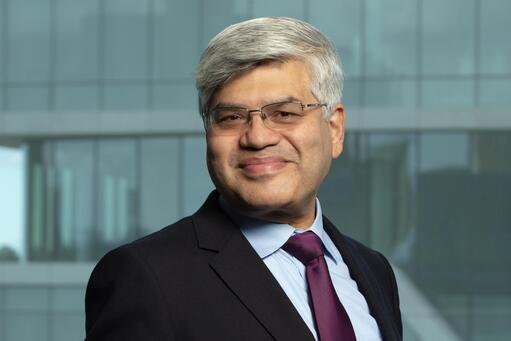Shivaram Rajgopal considers himself an “ESG pragmatist.”
The Roy Bernard Kester and T.W. Byrnes Professor of Finance & Economics and Auditing at Columbia Business School is on a mission to bring an evidence-based examination to the space, one that seeks to measure, report on, and compare companies' environmental, social, and governance (ESG) performance — at a time when its pervasiveness is expanding rapidly.
In 2023, the Securities and Exchange Commission's new rules requiring climate-related disclosures from US public companies will probably take effect; in the European Union, a new Corporate Sustainability Reporting Directive will also go live. These new laws will mean that many corporate leaders who have so far opted out of ESG measurement and disclosure will have to ramp up their understanding of the space quickly.
A leading expert on assessments of companies' environmental and Edge, Rajgopal would be the first to admit that a close look at today's ESG ecosystem can elude understanding. Reporting standards and key definitions are manifold and sometimes contradictory; claims by both ESG proponents and detractors have been exaggerated; and greenwashing has lurked among the honest attempts at ESG disclosure and improved sustainability practices.
ESG has charted a rapid and somewhat chaotic rise since it first emerged as a new acronym in a 2004 report from the United Nations Global Compact. From this very first report, the idea was that a consideration of ESG factors ought to be taken up by the various actors within global financial systems, who would put pressure on one another to deepen their shared commitment and ultimately build greener, more socially responsible economies. The report included ESG recommendations for companies, financial institutions, investors, financial analysts, regulators, stock exchanges, and others. Eighteen major financial institutions endorsed the report upon its publication.
It didn't take long for the ESG space to mushroom. Less than two decades after the UN report was published, total investment assets with an ESG filter are expected to surpass $41 trillion by the end of 2022, constituting more than a third of the total global assets under management, according to Bloomberg Intelligence. This is nearly double the total from just eight years ago.
Companies have responded in various ways to the ESG craze — in part through new practices like issuing ESG reports and public pledges. One such pledge that made headlines in 2019 was Business Roundtable's Statement on the Purpose of a Corporation, which was signed by 181 CEOs, including the heads of Amazon, JPMorgan Chase, Johnson & Johnson, Vanguard, BP, and Exxon Mobil. The companies committed to, in part, “investing in our employees,” “dealing fairly and ethically with our suppliers,” “supporting the communities in which we work,” and “[protecting] the environment by embracing sustainable practices across our businesses.”
Rajgopal wondered about the true impact of such a statement. Together with Aneesh Raghunandan of the London School of Economics, he investigated whether these signatory companies “walk the talk” when it comes to stakeholder-friendly practices. The results were not flattering: They found that, compared with their industry counterparts, publicly listed signatories on the statement committed more environmental and labor-related violations and emitted more carbon.
Rajgopal has also trained his evidence-based investigating on the asset managers within the ESG ecosystem. Again working with Raghunandan, he found that ESG mutual funds claiming to prioritize socially responsible stocks actually held more companies displaying lower compliance with labor and environmental laws than nonESG funds managed by the same institutions. Rajgopal's other research has suggested that carbon emissions disclosed by firms are probably not priced by equity markets and that negative screening (or avoiding stocks with poor ESG measures) probably doesn't impact the companies being avoided.
In the following interview, Rajgopal reflects on what his research is revealing about ESG, what improvements are called for in the space, and why he's still convinced — and even hopeful — that ESG is more than just a passing fad.
CBS: Do you believe that ESG as a specific lens on business and investing is here to stay?
Shivaram Rajgopal: I used to think this was a fad that would pass. But I'm now convinced otherwise.
For one thing, businesses tend to set the cost of natural capital at zero. By natural capital, I mean water, land, forest, minerals, oil. It might not literally be zero in their Finance & Economics, but it's so highly subsidized it might as well be economically zero. It's nowhere close to the price that extracting these things tends to cost society.
And second, we have the issue of externalities, which in the jargon simply means that in the process of doing something — say, smoking — you harm someone else — say, by putting secondhand smoke into the air. The classic way to resolve an externality is through some kind of tax, or policing by a regulator external to private parties. There has to be some kind of public intervention. And if regulators are not effective at dealing with negative externalities, is there another type of collective body that can bring pressure? That could be customers or investors or somebody else with some influence on what companies do.
CBS: Let's set the stakes for why you're on this intellectual journey, as you've put it, to better understand ESG and its impacts. To whom are the answers to your questions about ESG most important?
Rajgopal: Assuming one buys at least some of what I just said, I would argue that the stakes are pretty high for anyone involved in the corporate process.
A lot of the pension funds and the institutions certainly want to know the answers to these questions about ESG, because they're the socalled universal owners, which means people who hold stocks for long periods of time.
And if you're sitting on a corporate board, don't you also want to know the answers to these questions? For some businesses — such as those in agriculture, water services, insurance, or tourism — you're already beginning to feel the financial impact of climate change on your revenues and costs. And think about the next generation: They believe that we've not done such a good job of taking care of common resources. Their consumption decisions, future voting decisions, etc., are perhaps going to be shaped by this worldview. So, as a business, you're probably better off, as the cliche goes, knowing where the puck is headed.
There's been a change in the zeitgeist; the social conversation has shifted. It's like a perfect storm of many, many things coming together to push companies to have a closer look at those two ideas: 1) Why are we assuming that the natural capital that's been given to us is basically free, and 2) will there be pressure to account for our negative externalities?
CBS: Your research has shown, however, that ESG rating, reporting, and investing as it exists today has some problems — for example, businesses don't always live up to their pledges and the stated impacts of ESG investing don't always bear out in reality. Has this repeated finding surprised you?
Rajgopal: No, it's sadly become depressingly routine now. We end up finding, in setting after setting, that companies don't necessarily walk the talk. All the tall claims about how ESG is risk-reducing and cash-flow increasing don't really seem to hold water or show up robustly in the data, despite loud claims to the contrary by interested parties.
And conceptually, why would we expect such links between externalities and cash flows? If nobody is going to make Coca-Cola pay for the plastic water bottles that don't get recycled, for instance, why would it show up in their current or future cash flows? So maybe one way to read this work is that it's simply pointing to a failure of the political system to regulate externalities. And maybe regulation or a carbon tax is the only answer, but that's a conversation that, given our polarized world, nobody wants to have.
CBS: How can ESG improve? What recommendations do you have for those working within the space?
Rajgopal: I think it's basically time to have a cold shower and then just sit down and think a little more dispassionately about claims on both sides of the ESG debate; that's one recommendation. Both sides have overstated their cases massively.
In terms of investors, I think the whole ecosystem of standard setting, reporting, and measurement has become a runaway train and out of control. There's a whole alphabet soup of NGOs in this space trying to set standards. It's a cacophony in that world. And the rating agencies do not necessarily tell us what their process really is for arriving at their ratings. The whole ecosystem needs reform.
If you're on a corporate board or leading a company, it's pretty much inevitable that you have to have a conversation about ESG. So, I would say do it with authenticity and rigor and don't overclaim. People are smart. They'll figure it out if all you're doing is some kind of greenwashing. And it's quite likely that there are at least branding-based benefits to being seen as a sustainable company, one that actually walks the talk. Your sales on average may be slightly higher. You're more likely to attract and retain smart talent.
One more thing for the board: consider declaring who your top two stakeholders are. That kind of focus makes everyone's life easier. We usually do not ask CEOs to manage two or three key issues in their non-ESG work. Why not extend that logic to ESG? And, rating agencies and others will have an easier time rating your performance related to the two stakeholders you identified. In fact, the stakeholders you leave out may also say a lot about you as a company. So, the selection has to be done carefully, but adding such focus may be a worthwhile exercise.
If you're someone who wants to join a company to work on sustainability and ESG, you can probably get a sense of a company's values by asking simple questions, such as, “Who does the chief sustainability officer report to?” If the person reports to PR or investor relations, I get a bit nervous — because the tendency is always to spin. If, on the other hand, they report to the CFO or maybe even to the CEO, that's excellent news, because this tells me that sustainability is part of the company's DNA in terms of strategic focus.


